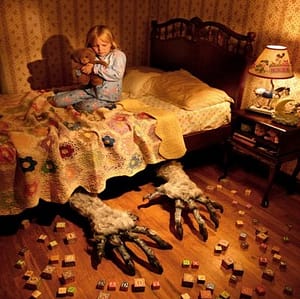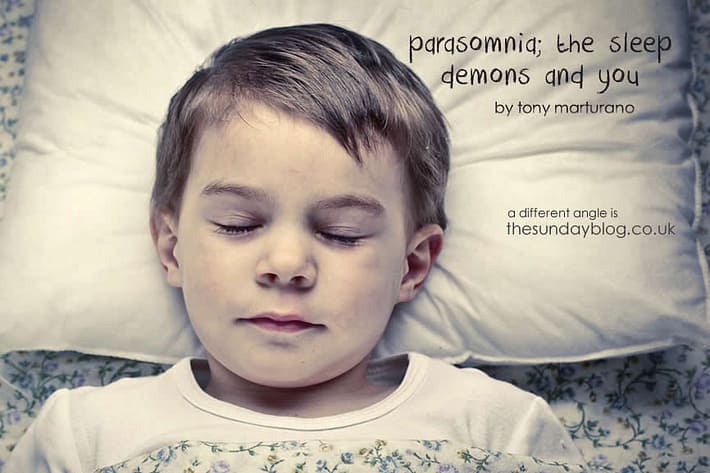PARASOMNIA; THE SLEEP DEMONS AND YOU
So what are they like for you?
Creepy, happy, scary, terrifying or downright x rated?
Most of us dream every single night, we just don’t remember, which is really disappointing when it’s a good dream. However, there are others that we would much rather forget yet, for some horrifying reason, cannot. You know, generally when the actions, emotions or both are rated 18 and they feature, for some obscure reason, somebody we know…but would never have put in that context, say for example a work colleague.
Eww!
I would like to stress that I don’t think I’ve ever had that kind of dream, on the other hand, I may have I just can’t remember, and for good reason!
All of this is fairly normal so please don’t stress. By that I mean that just because you dreamed of your boss posing in some speedos and you slathering him in baby oil, it doesn’t mean that you actually want to, um, well slather him (or her) in baby oil or anything else for that matter! Whilst much isn’t really known about dreams, one thing is true; they are the bi product of a very active (for some) and very complex part of our body, our brain, that has to manage billions of synaptic ‘firings’ day and night, so it isn’t so unusual for some wires to get ‘crossed’.
For example, the widely experienced phenomenon of Dejavu (French for already seen) is a common example of a ‘glitch’ in our brains. To experience Dejavu is to have the perception that you’ve already seen or experienced a particular moment in time. The perception is that the moment already took place in our distant past. However, the general belief among scientists is that it did not. Dejavu is actually caused by a person having a brief glimpse of an object, an expression of words, or a situation before the brain completely finishes constructing the memory, it then results in a false sense of familiarity. This basically means; if it feels like you’ve already experienced that exact moment before, chances are you have not, you are experiencing it now. Some studies have tried to identify a link between Dejavu and other mental illnesses but failed to find any.
So, is it Science of Mysticism?
For many, our dreams remain one of the most mystical of experiences we will ever have, outside of joining Hare Krishna or a Kabbalah group but is dreaming mystical or is it our brain’s way of trying to bring something to our attention?
When’s the last time you dreamed and can you remember what you dreamed about? And did you try to self-analyse yourself? If you did, did you use one of the countless bestselling books available on the subject?
No?
Why not? There are many people who swear by the interpretations of these authors who divine all sorts of things. The A – Z of Dreams, The Big Book of Dreams, or some other imaginative title like, say Dreams. Each and every one of them ready to explain things from Money to Abdomens. And because dreams maintain a level of mysticism for all of us, we’ll happily buy into the opportunity to have those random images explained to us. For example, did you know that dreaming of your ‘abdomen’ is to dream about ‘natural instincts’ and ‘repressed emotions’, although that does depend on whether or not your belly is exposed. If it’s covered up then the above applies but if you’re parading it then it suggests that you have ‘issues’ with ‘trust’ and ‘feeling’. On the other hand, if your belly is swollen, well…. It’s actually supposed to mean that a ‘new project’ is in store for you. Meanwhile, dreaming of ‘marriage’ signifies ‘commitment’, ‘harmony’ and that you’re undergoing ‘changes’.
Really?
Money means ‘success’ and ‘prosperity’ whilst ‘Monday’ signifies the start of something while dreaming of a ‘monster’ is to dream about something of yourself that you ‘dislike’ or believe is ‘ugly’.
Well, I don’t know about you but I’m starting to get a pattern here. There really isn’t any big revelation. Moreover, there’s a distinct possibility that these ‘meanings’ will vary depending on which ‘source’ you choose to obtain your ‘interpretation’ (so please don’t write in!).
One thing about the above is true; our dreams are an unlikely manifestation of our repressed fortune telling abilities but more an expression of something that’s either on our mind or buried deep in there, either as a result of childhood experiences or seeds of thoughts that have germinated in our subconscious and are trying to grow their way into our consciousness. And there’s one simple explanation for this; dreams are the bi product of our brain’s industrious information processing plant.
But what do the experts think?
Well, the general consensus, despite years of endless research is that much is still unknown about why we dream but psychologists have some theories.
Rehearsing Fight or Flight
Ever noticed how, in some of your most terrifying dreams, you’re being chased by some hideous monster (or just your boss) or sinking in quicksand, or generally having the living nightlights (see what I did with that?) scared out of you? Well, psychologists believe that this is part of our evolution process. It’s our brain ‘training us’ for flight or fight so that on the off chance that we may actually find ourselves being chased by a giant marshmallow monster with teeth whilst trying to extricate ourselves from a puddle of a black unidentifiable substance that can only be described as treacle, we’ll know exactly what to do.
 What the frag?
What the frag?
Francis Crick (co-discoverer of the structure of DNA) and Matt Wilson (of MIT, Cambridge, USA) share a similar view; dreaming is actually our brain ‘defragmenting itself’. For those who may not be familiar with this computer jargon, ‘defragmenting’ the hard drive (of your computer) is the equivalent of tidying up a messy room; put everything in its place so it’s much easier and faster to find it later. Well, dreaming is the equivalent of defragmenting our brain. As we dream, our brain is sifting through all the memories and deciding which ones to keep and which ones to throw out so that flicker, or REM (Rapid Eye Movement) is our hard drive busying itself, reorganising all of our thoughts and memories hence why we don’t always remember the process (the dreaming) but we do remember the result (ability to access random bits of information from the present and distant past)
Dreaming Therapy
Then there’s another theory, probably the most plausible and one widely used among psychotherapists. They believe that our dreams are some kind of subliminal therapy insofar as they allow us to deal with ‘feelings’ and ‘emotions’ that we’d be otherwise incapable of dealing with on a more ‘conscious’ level. This is one of the reasons why psychologists are often very interested in a patient’s dream as it’s, in their opinion, most likely indicative of feelings or thoughts that the patient is wrestling with, be it stress, deeply buried trauma (something bad that has happened historically that the ‘self-preserving’ mind is trying to hide) or present trauma. A dream (especially a recurring one) is often the sign of something that is troubling us much more than we’re able to appreciate, and because the imagery isn’t always straight forward, it’s often difficult for us to interpret them without an interpreter but he or she happens to be a therapist and not some kind of mystical diviner.
On the other hand, there are those who believe that dreams are nothing more than the synoptic rambling (firing) of a subconscious mind, thoughts, pictures, memories flickering randomly, like a television, through channels without any aim or purpose. You know, like one of your children or maybe even your partner, manically pressing that remote without ever settling on one channel, aaaaaaah!
Whatever the belief, REM (Rapid Eye Movement and not the successful band), that generally takes place in deep sleep represents a ‘chance to dream’, it’s the Fantasy Island of the domestic world, the magical mystery tour that takes us to far flung places, rub shoulders with our idols, often makes us irresistible to the object of our affections and lulls us into believing that life, as we know it, is perfect so much so that we don’t want to wake up.
Conversely, they’ll be times when all we want to do is wake up by we’re unable to do so. This generally happens when our life or that of somebody we love is in peril and we’re unable to do anything about it, like screaming for help or stop ourselves from falling.
Welcome to your nightmares
Some experience nightmares regularly whilst others sporadically but the result is always the same; fear, anxiety, despair, horror and perspiration, often accompanied by screaming and maybe even sobbing. Our mind’s exposure to our deepest and most chilling fears is like a toothbrush over exposed nerve endings; it’s acute and very traumatic to the point where it leaves many with an immense feeling of fear, dread or sadness. Some of the most common and most terrifying nightmares feature the protagonist (us) or somebody we care about in extreme peril and us being unable to do anything about it. Mercifully, it’s at the prelude to or during the negative dream’s terrifying climax that we awake, sometimes screaming, to the safety of our bedroom to find everything in its place, including the shadows observing us from behind the furniture. It’s this terrible sense of turmoil (fear and relief) that many who experience nightmares will be wrestling with in the dead of night but, thankfully, whilst like a lingering fog, the nightmare wears off with eventual sleep and time.
Sadly, because the universe of the subconscious is vast and generally unreachable, scientists aren’t absolutely sure about what triggers a nightmare. What is known is that they generally occur (not unlike the dream therapy) when the sufferer is plagued by some kind of unacknowledged mental anxiety, something that hasn’t been dealt with or needs to be dealt with. It’s a common reason why some nightmares are recurring.
about what triggers a nightmare. What is known is that they generally occur (not unlike the dream therapy) when the sufferer is plagued by some kind of unacknowledged mental anxiety, something that hasn’t been dealt with or needs to be dealt with. It’s a common reason why some nightmares are recurring.
When I studied psychology, one of the unsurprising topics was dream interpretation as were nightmares as they’re believed to be a clear indicator of repressed anxiety. It’s widely believed that if you identify and acknowledge the underlying instigator (confront the anxiety) then you’ve banished the nightmare. For recurring nightmares, this takes place through therapy as well as a method known as ‘lucid dreaming’, where the patient is able to confront his metaphorical demon and banish it, and by association the nightmare.
Yet there is one nightmare mutation, one of the most terrifying, that isn’t quite as easily banished. Many parents will be all too familiar with the symptoms that generally include being wrenched from sleep by the blood curdling screams of their offspring. They’ll then race, half stumbling to their child’s room to be presented with a vision of their child, bolted upright in bed with eyes bulging in horror, staring right through them at an imaginary entity behind their shoulder.
Night terrors are commonly experienced by children between the ages of 3 – 13 but adults between the ages of 20-30 are also known to suffer from this syndrome which is often wrongly confused as a nightmare. Unlike nightmares, night terrors are much more debilitating; sufferers are often inconsolable in the belief that something or someone is pursuing them, to the point where they’ll attempt to flee from the entity, violently lashing out at the imaginary attacker, harming anyone and breaking anything in their path. Sufferers may appear to be wide awake but they are asleep and thus often unresponsive to the touch and or the voices of loved ones. Most of those who experience this parasomnia generally do not remember anything about the incident the following day.
Again, there is no definitive research explaining the cause of night terrors. What is known is that children will generally ‘outgrow’ them. The syndrome can also be treated with psychotherapy and or benzodiazepines.
But what if some demons are all too real?
 The Sleep Demons
The Sleep Demons
Folklore from around the world will have its own different interpretations of the sleep demons. For example, Italians will talk about the diminutive demon that crawls up onto your bed and sits on your stomach. So much is the creature’s weight that it makes it impossible for its hapless victim to breath so they eventually suffocate and die in their sleep.
Incubus (from the Latin to lie upon), as it’s more commonly known, is the variation of the above and refers to a male demon who will generally appear to females with the sole intent of having sex with them. Succubus is the female equivalent (how appropriate). Ancient folklore states that to repeatedly have sex with either of these demons will eventually result in death.
‘Sleep paralysis’ is a well known phenomenon that affects people either when they’re about to fall asleep or just as they’re waking up. It’s the twilight between consciousness and unconsciousness. Sufferers of sleep paralysis will experience total muscle ‘atonia’ (weakness) which results in a feeling of paralysis that is then accompanied by a sense of terror that some thing or someone is actually holding them down, making it impossible for them to move whilst, in reality, the only thing holding them down is the fact their own mind hasn’t yet been fully aroused from sleep. Sleep paralysis is believed to be the result of disrupted REM (or deep) sleep during which you’d normally ‘act out’ your dream rather than ‘consciously’ and, by association, be physically incapable of fufilling the sleep pattern.
Whatever your belief, scientific or mystical, the fascination with our dreams will continue until the complexities of the unconscious machinations of our brain have been fully unraveled. For scientists, the ability to record the imagery inside our minds would be a priceless discovery with multiple positive applications, including therapy, and that’s why research is already ongoing to this effect.
Until then, I guess the A-Z of dreams is probably the best place as any to attempt to understand what exactly goes on in your mind when your body is at rest. That or you could just have your brother analyse them for you. At least that’s my sister’s philosophy!
Whatever you dream. “Don’t have nightmares” but have a restful Sunday. 🙂
“Dream as if you’ll live forever, live as if you’ll die today”. – James Dean
If you LIKE this article please LIKE the Facebook page or subscribe to this blog to have posts delivered directly to your inbox. Your email address is not stored to send you pesky SPAM and you can unsubscribe at any time.

1 Comment
A most fascinating subject and have experienced quite a few of the Dream Variations mentioned what are we without our Dreams ?t.the Dreams we want to aspire to and the Dreams we have during REM .all equally as Important .
They reside with us for so many years after we have dreamt them and are familiar as old Friends even the Nightmares ..I have some I remember from when I was Five Years old .
(“Dream as if you’ll live forever, live as if you’ll die today”. – James Dean ) I like this and think he did exactly that we should all learn from this litte quote .obviously a lot of Research went into this Article Thank you for doing the Leg Work Thoughtfuly written as always .